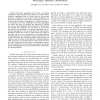Free Online Productivity Tools
i2Speak
i2Symbol
i2OCR
iTex2Img
iWeb2Print
iWeb2Shot
i2Type
iPdf2Split
iPdf2Merge
i2Bopomofo
i2Arabic
i2Style
i2Image
i2PDF
iLatex2Rtf
Sci2ools
126
Voted
INFOCOM
2010
IEEE
2010
IEEE
Delay Performance of Scheduling with Data Aggregation in Wireless Sensor Networks
—In-network aggregation has become a promising technique for improving the energy efficiency of wireless sensor networks. Aggregating data at various nodes in the network results in a reduction in the amount of bits transmitted over the network, and hence, saves energy. In this paper, we focus on another important aspect of aggregation, i.e., delay performance. In conjunction with link scheduling, in-network aggregation can reduce the delay by lessening the demands for wireless resources and thus expediting data transmissions. We formulate the problem that minimizes the sum delay of sensed data, and analyze the performance of optimal scheduling with innetwork aggregation in tree networks under the node-exclusive interference model. We provide a system wide lower bound on the delay and use it as a benchmark for evaluating different scheduling policies. We numerically evaluate the performance of myopic and non-myopic scheduling policies, where myopic one considers only the current sys...
Related Content
| Added | 28 Jan 2011 |
| Updated | 28 Jan 2011 |
| Type | Journal |
| Year | 2010 |
| Where | INFOCOM |
| Authors | Changhee Joo, Jin-Ghoo Choi, Ness B. Shroff |
Comments (0)

